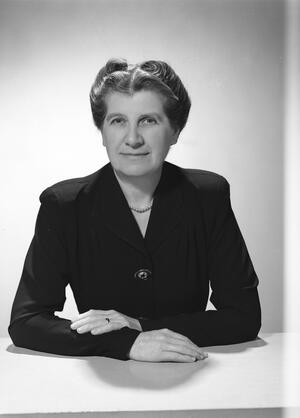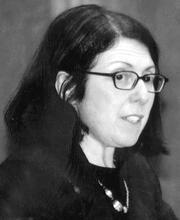Ida Lewis Siegel
Ida Lewis Siegel’s volunteer work greatly benefited the Toronto community, both Jewish and non-Jewish, and she was particularly dedicated to Zionism and education. In 1916 Siegel helped bring The Women’s Zionist Organization Hadassah to Toronto, and in the 1930s she worked tirelessly for the Youth Aliyah. Siegel’s organizing talents over the decades benefited many Jewish community institutions, including the Jewish Endeavor Sewing School, the Associated Hebrew Charities, and both the Youth Men and Youth Women’s Hebrew Associations. Siegel was also involved in the wider Toronto community. She was the first treasurer of the Children’s Welfare Council of Toronto, and in 1931 Siegel was elected a trustee of the Toronto Board of Education. She raised six children with her husband and died in 1982.
Early Life & Zionist Activism
One of the most indefatigable and effective volunteer leaders in the history of the Toronto Jewish community, Ida Siegel either herself founded or participated in the establishment of many of the community’s most significant Zionist and welfare institutions. Even more unusual for the time and place, she played an active role in the affairs of the city at large. Born Ida Lewis Siegel in 1885 in Pittsburgh, she was brought to Toronto as a child in 1893 or 1894 by her parents, Samuel Lewis (1859–1942) and Hannah Ruth (née Ticktin) Lewis (1864–1937), both of them originally from Kalvaris, Russian Lithuania. She was to make an indelible mark on her adopted city.
A year after her marriage to Isidore H. Siegel, a traveling salesman (b. 1877 in Russian Poland, d. 1933), the twenty-one-year-old woman organized the Hebrew Ladies Sewing Circle to provide recreational activities for young Jewish women. The Circle was intended to be a counterweight to the Presbyterian Jewish Mission which had opened the same year. Even earlier, she had helped to found the first women’s Zionist group in Canada, the Daughters of Zion (1899), and the Herzl Girls Club (1904). Zionism was to be a life-long passion. In 1916, she was instrumental in bringing Hadassah, the American women’s Zionist association founded by Henrietta Szold, to Toronto. In the 1930s and later, she worked tirelessly for Youth Lit. "ascent." A "calling up" to the Torah during its reading in the synagogue.Aliyah, Hadassah’s program for bringing young refugees from Nazism to Palestine. For a time, she served as a vice-president of the Zionist Organization of Canada.
Community Work in Toronto
Among the Jewish community institutions that benefited from Siegel’s organizing talents were: the Jewish Dispensary, founded in 1909 to provide medical care to immigrants in a congenial setting (later replaced by Mount Sinai Hospital); the Jewish Endeavor Sewing School, begun around 1912 to keep Jewish girls beyond the reach of missionaries, which evolved into a model Sunday school; the Associated Hebrew Charities founded in 1912, which by 1916 had developed into the Federation of Jewish Philanthropies, the first comprehensive Canadian Jewish charitable agency organized along progressive lines, the forerunner of today’s UJA/Federation of Greater Toronto; the Women’s Orthodox Auxiliary, organized in 1918 to finance the educational activities of four large Toronto synagogues; and the YM/YWHA (now the Jewish Community Centre), which opened in 1921. Siegel was active in the University Avenue Synagogue and after its merger and relocation was named honorary president of the new Beth Tzedec sisterhood. She was also the organizer of the Toronto chapter of the Women’s League of the (Conservative) United Synagogue of America.
Siegel’s work in the wider community made less of an impact than her work with the Jewish community. It is noteworthy, however, because of her forthright stand against assimilation and her ability as an outspoken Jew to gain a measure of acceptance in prejudiced WASP Toronto. One of her earliest endeavors was the establishment at a public elementary school of a mothers club to provide wholesome leisure activities for the girls, most of whom were Jewish. The club evolved into the Home and School Association. Another group to benefit from her involvement was the Children’s Welfare Council of Toronto of which she was the first treasurer. In 1931, Siegel was elected a trustee of the Toronto Board of Education, but she was defeated two years later when she ran for city council. Both as a Jew and as a woman, the battle for electoral office was uphill.
Family
Her many public activities notwithstanding, Siegel and her husband, with help from Siegel’s mother, raised a family of six children: Rohama Lee (1905–?); Leah Gittel Labovitz (1907-2004); David Isar (1909-2004); Sarah Sontag (1912–1942); Avrum Fischel (1916-2010); and Rivka Hadassah Gurau (1923–2001). Rohama became famous for a brief moment as a stowaway on the maiden voyage of the Queen Mary in 1936. Siegel’s great-granddaughter is Rabbi Gail Labovitz (b. 1966), ordained in 1992 at the Jewish Theological Seminary of America and at present the coordinator of the Jewish Feminist Research Group there.




